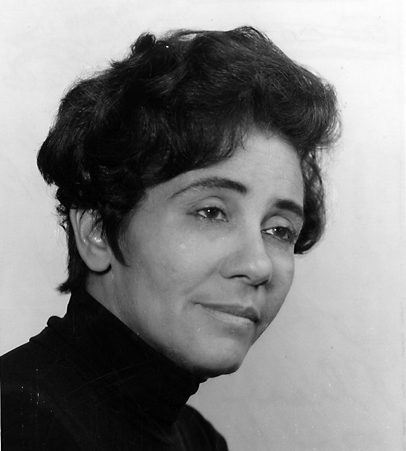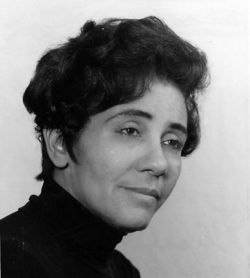Pinkie Gordon Lane
Celebrated poet and educator Pinkie Gordon Lane was Louisiana’s first Black poet laureate.

State Library of Louisiana
Pinkie Gordon Lane in 1972
Pinkie Gordon, Louisiana’s first Black poet laureate and the first Black woman to earn a PhD from Louisiana State University (LSU), was born in 1923 in Philadelphia, Pennsylvania. She was the only one of William Alexander Gordon and Inez Addie West Gordon’s four children to survive childbirth, and by the time she’d graduated from the distinguished Philadelphia School for Girls in 1940, both her parents had died. Loneliness would later be a thread connecting many of her poems.
Education
Pinkie Gordon enrolled at Spelman College in 1945 and graduated magna cum laude in 1949 with bachelor’s degrees in English and art. In 1956 she earned her master’s degree from Atlanta University. She married Ulysses Simpson Lane, and in 1957 the couple moved to Baton Rouge, where, as Mrs. Lane, she began teaching at the English Department at Leland College in Baker. In 1959 she transferred to Southern University, where she would remain for twenty-eight years.
Though Lane married, she continued to pursue her own professional goals. Lane pursued a PhD across town at LSU. She earned her degree in English at LSU in 1967, four years after giving birth to her only child, Gordon.
Professional Career
Lane served as Southern University’s first woman chair of the English Department while her husband’s health deteriorated. He died in 1970, and Lane forged ahead for most of her esteemed career as a widow and single parent.
“Pinkie didn’t want to be known as a Black poet, but simply as a poet,” explained Margaret Ambrose, a friend and colleague in the English Department at Southern University. “It was important to her that she write about her racial experiences and beyond it. She wanted to reach a universal audience, and her poems did reach across racial lines at the time.”
However, Lane faced criticism from peers and the faculty she supervised for exactly that: criticism that her poetry was not Black enough. Some of her critics felt she was not reflecting the times of the Civil Rights and Black Arts Movements. But her struggle was not just racial; she was a woman in a position of power, a prime target for sexism and misogyny.
Lane never gained the readership of her contemporaries. Nevertheless she was widely published in journals and anthologies, and she published five books of poetry: Wind Thoughts (1972), The Mystic Female (1978), I Never Scream: New and Selected Poems (1985), Girl at the Window (1991), and Elegy for Etheridge (2000). The Mystic Female was nominated for a Pulitzer Prize in 1979.
A Louisiana First
Lane was appointed Poet Laureate of Louisiana by Govenor Buddy Roemer in 1989 and served as the first Black poet in that role until 1992. She also represented the state in the 1996 Olympic torch relay. In addition, world-renowned music director and conductor Dinos Constantinides scored classical compositions in the late 1980s called “Listenings and Silences for Voices Alone” based on Lane’s poems. Most notably her work found a wide audience over the past several decades. Her poem “Lyric: I Am Looking at Music,” from Girl at the Window, was read aloud by actress Nia Long in the 1997 major motion picture Love Jones. With this singular honor, Land received a much wider audience than her contemporaries.
In 2008 Lane died at the age of eighty-five. Today Southern University’s John B. Cade Library hosts an annual Pinkie Gordon Lane Poetry Contest. Each year students from across the state submit poems that vary across poetic themes and racial lines. Winners are invited to Southern University’s campus in April for an awards program with a keynote speaker and reception.
In 2022 LSU’s Board of Supervisors voted unanimously to name its Graduate School after Lane.
